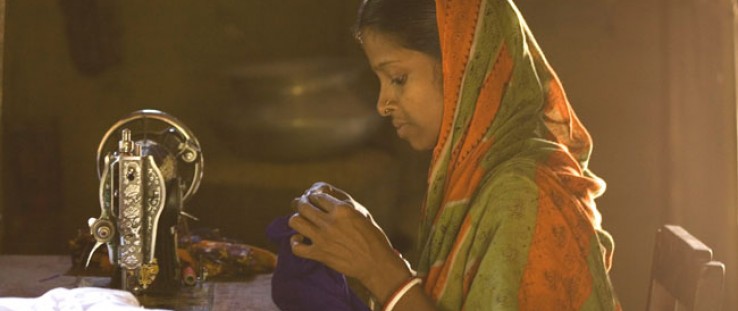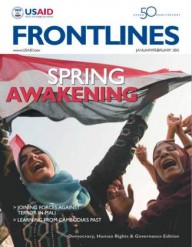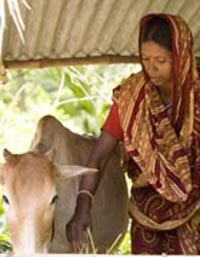 Since 2009, USAID’s Actions to Combat Trafficking-in-Persons program has been working closely with the Government of Bangladesh to help survivors of human trafficking through counseling and life skills training.
CREDIT: WINROCK INTERNATIONAL
Since 2009, USAID’s Actions to Combat Trafficking-in-Persons program has been working closely with the Government of Bangladesh to help survivors of human trafficking through counseling and life skills training.
CREDIT: WINROCK INTERNATIONAL
 Since 2009, USAID’s Actions to Combat Trafficking-in-Persons program has been working closely with the Government of Bangladesh to help survivors of human trafficking through counseling and life skills training.
CREDIT: WINROCK INTERNATIONAL
Since 2009, USAID’s Actions to Combat Trafficking-in-Persons program has been working closely with the Government of Bangladesh to help survivors of human trafficking through counseling and life skills training.
CREDIT: WINROCK INTERNATIONAL
The opportunity was too good to pass up. Shantos was 20 years old when a group of men came to his village in Bangladesh. They promised him a job in India, a little less than $100 for 50 days of work as a mason. He believed them. It was only after leaving home that he realized what was going on. He came back scared and desperate, but wiser, after 28 months in an Indian jail, arrested after he could not produce his passport to a local police officer.
For Sonaly, who was only 16 when she was sold to a brothel, there was no place to come home to.
Fatema, at 22, was locked up in a room and tortured for 14 days before she found the courage to escape.
With USAID’s help, Shantos, Sonaly, and Fatema, three victims of human trafficking, have found new lives.
Human trafficking is today the third most profitable crime in the world after illicit drug and arms trafficking, resulting in an estimated $30 billion to $32 billion in profits worldwide each year.
Since 2005, USAID and the Government of Bangladesh have collaborated to address human trafficking on two fronts: by preventing it and by alleviating the suffering of its victims. Bangladesh is a major source and transit country for men, women, and children subjected to both forced labor and sex trafficking. Men typically are fraudulently recruited to work overseas, especially to the Middle East and Gulf countries, and are subsequently exploited under conditions of forced labor or debt bondage. Bangladeshi children and women are trafficked for commercial sexual exploitation, domestic servitude, and forced labor.
For the past three years, Bangladesh has been included on the Tier 2 Watch List in the Department of State’s Annual Trafficking in Persons (TIP) Report. Under State’s tier placement system, rankings are determined based on the extent of a government’s actions to combat trafficking: Tier 1 signifies the highest degree of government action, and Tier 3 is the lowest ranking. Countries on the Tier 2 Watch List, like Bangladesh, are those whose governments do not fully comply with the minimum standards of the U.S. Government’s Trafficking Victims Protection Act, but are making significant efforts to comply.
Protection and Prosecution
In Bangladesh, USAID’s anti-trafficking program is implemented by Winrock International under the Actions to Combat Trafficking-in-Persons program (ACT), a four-year initiative that began in 2009 to reduce trafficking in men, women, and children in that country.
“The ACT program’s prevention efforts focus on protection and prosecution. The program works with government institutions to identify and prosecute perpetrators, empower survivors of trafficking and those at risk, provide viable economic alternatives to unsafe internal and cross-border migration, and expand public awareness and prevention efforts to include labor migration abuses and victimization of men,” said Habiba Akter, USAID/Bangladesh’s human rights and rule of law adviser, who manages the ACT program.
Still, the legal and justice systems need updating. Cases of human trafficking are seldom filed, and perpetrators are rarely sentenced for their crimes. In addition, the existing legal framework on trafficking ignores labor and internal trafficking, and acknowledges only women and children as potential victims. Sometimes law enforcement agencies prefer not to file a trafficking case due to mandated investigation timelines. Out-of-court settlements between perpetrators and victims’ families also hinder prosecution.
Since 2009, USAID’s ACT program has been working closely with the Government of Bangladesh to develop a comprehensive gender-sensitive, national anti-trafficking law and action plan on trafficking. The draft version of the law, with expected parliamentary passage in January 2012, is endorsed by Prime Minister Sheikh Hasina and her cabinet, an indication that the government is committed to preventing trafficking and punishing those convicted of the crime. An action plan for 2012-2014 is under development, and will guide monitoring to combat human trafficking in the country.
“The anti-human trafficking act has been enacted in conformity with the Women and Children Repression Prevention Act, 2000 [that includes capital punishment]. The other punishment for human trafficking will be a life term or a fine of BDT 500,000 ($6,756) or both,” said Abul Kalam Azad, the prime minister’s press secretary, quoted in local media.
Messaging Blitz
On a local level, the ACT program has reached out to more than 90,000 people with anti-trafficking and safe-migration messages through school campaigns, media, and posters. ACT has coordinated with MTV’s EXIT Campaign (End Exploitation and Trafficking), which also is supported by USAID, and launched SOLD in November 2011, a documentary that aims to raise awareness of human trafficking nationwide.
Another short film, Echo: Survivor’s Voice, which launched on the same day as SOLD, documents the stories of 15 migrants who are victims of human trafficking. Bangladesh’s minister of home affairs attended the premiere in Dhaka, along with representatives from the Ministry of Labor and Expatriate Welfare and the Ministry of Women’s and Children’s Affairs.
A Fresh Start for Survivors
For survivors, USAID’s program focuses on empowerment. Although the campaign is young, many former victims have already become activists and are increasingly speaking out about their experiences. Past victims are participating in awareness-building activities to prevent trafficking and to support the reintegration of victims into society.
ACT supports four shelters for human trafficking survivors that offer comprehensive psycho-social, medical, and reintegration assistance. To date, ACT has supported over 1,100 survivors and successfully reintegrated over 900 of them into their families and communities in Bangladesh.
“Successful reintegration is a systematic process rather than just handing over to the family,” said Sharmen Shahria Ferdush, a staff member at an ACT-supported shelter in Jessore. “We are keeping in mind that survivors’ choices, expectations, socio-cultural context, security are more important for reintegration. We are preparing survivors to make their own decisions and simultaneously sensitize the community to change their attitude towards survivors.”
And Shantos? Sonaly? Fatema?
After his return from India, Shantos enrolled in the ACT program and received counseling and life skills training to regain his self-confidence and plan for his future. He also received training to become a local medicine shop worker. After working as an intern, he now has his own shop but volunteers regularly to raise local awareness on the risks of human trafficking. “Being poor, I dream of supporting the disadvantaged and poor, but, unfortunately, I became a victim of trafficking and can’t interact with all people in my community,” said Shantos, now 22. “Now, people of my village come to me for help when they face a health problem, and I can help by sending them to the right person at the right moment.”
Sonaly was rescued from the brothel and brought to a shelter. There, she received personal counseling and learned to live more independently. She also learned to operate a sewing machine and how to repair mobile phones. Now she sews shopping bags for an NGO while completing an internship in a mobile phone service shop.
Fatema is back home, working as a seamstress. Her designs are popular with the people in her village, and she hopes to exhibit them soon at a showroom in town. She would like to set up her own shop and is saving money to get it started. No longer a target for humiliation and jokes, she stands proudly, wearing her own designs.
For each Shantos, Sonaly, and Fatema, there are thousands more survivors able to turn a new page in their lives due to USAID’s anti-trafficking efforts worldwide.
“In our development programs, USAID is tackling the conditions that enable the trafficking of humans, such as barriers to education and job opportunities, ethnic and gender discrimination, weak rule of law, and the drivers of conflict and corruption,” wrote Sarah Mendelson, deputy assistant administrator in USAID’s Bureau for Democracy, Conflict and Humanitarian Assistance, in a recent post on USAID’s Impact Blog. “Since 2001, USAID has worked in 70 countries to prevent trafficking, protect victims, and prosecute perpetrators.”
Added Alexious Butler, director of the USAID/Bangladesh Democracy and Governance Office: “We will continue to work to ensure that both the government and the local people hear and understand the voices of those affected by human trafficking and take actions to end this modern day slavery.”










Comment
Make a general inquiry or suggest an improvement.